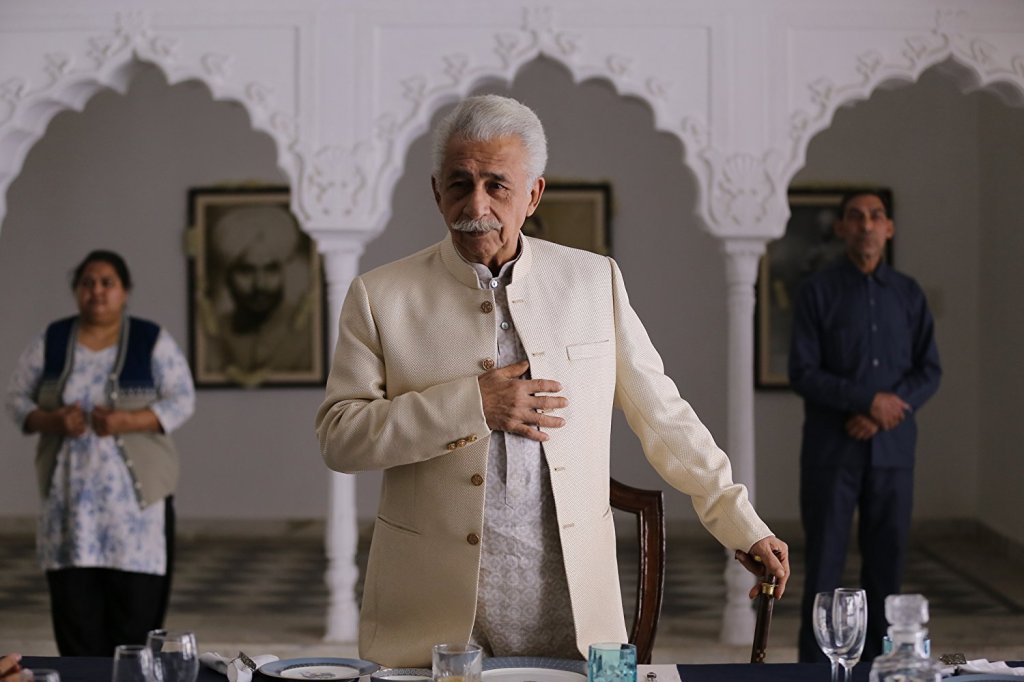18th Annual NEW YORK INDIAN FILM FESTIVAL
May 7-12, 2018
REVIEWS
|
vaguevisages.com
New York Indian Film Festival Review: Bornila Chatterjee’s ‘The Hungry’
Bedatri Datta Choudhury,
May 9, 2018
|
| |
 |
| |
“O, why should nature build so foul a den, Unless the gods delight in tragedies?”
-William Shakespeare,Titus Andronicus
Literary critic S. Clark Hulse notes that Shakespeare’s Titus Andronicus is a play with “14 killings, 9 of them on stage, 6 severed members, 1 rape (or 2 or 3, depending on how you count), 1 live burial, 1 case of insanity and 1 of cannibalism — an average of 5.2 atrocities per act, or one for every 97 lines.” The tragedy, one of the Bard’s earlier works, is marked for its graphic violence and gory stage directions. In choosing to adapt this play for her film The Hungry (2017), Bornila Chatterjee makes an informed choice to play around with a stage production that isn’t ubiquitous, thereby allowing herself to create an impression on audiences who have not already been acquainted with adaptations. The play is the story of the Roman general Titus who earns the wrath of Tamora, the Queen of Goths, by sacrificing her eldest son to avenge the death of his own sons in war. The rest of the narrative is an ever-deepening bloodbath fought in pursuit of revenge.
The Hungry focuses on Tulsi Joshi (played by Tisca Chopra), who Chatterjee draws out to be a hybrid of Tamora and Titus; she is both the vengeful victim and the last standing hero of the tragedy. Tulsi agrees to marry the cocaine-addicted Sunny (Arjun Gupta) — the son of business scion Tathagat Ahuja (Naseeruddin Shah) — and arrives at her own wedding prepared to avenge the death of her older son, Ankur (Suraj Sharma). The drama takes place in Northern India, complete in its foreign-returned accents, ridiculous richness, awkward poshness and insatiable greed. It is nature’s foul den, and Chatterjee — like God (and Shakespeare) — delights in churning out a tragedy out of this cesspool of greed.
|
 |
| |
In the rewriting of the play, Chatterjee does away with the Tamora’s ruthless, inhuman rage and replaces it with a murder plot emerging out of a maternal idea of revenge and justice. Unlike the men she fights, Tamora is not after the money that the marriage of convenience promises; her cruelty is always portrayed as a result of the crossplay between the patriarchal structures of money and marriage, a trap she has been stuck in since her birth. In Tulsi, Chatterjee presents the golden conventions of the caring, loving Bollywood mother with subtle revisions; she is a caring mother but also a woman who is fully aware of her sexuality and knows how to effectively use that sexuality to get things done. While Chopra, with her lilting voice and seductive smile, packs in quite a punch, one does wish that her character still retained some of Tamora’s unbridled pride and cunning.
Shah, as Tathagat Ahuja, represents the perfect embodiment of the greedy, evil villain who maintains the perfect facade of classiness with his impromptu poetry recitation and knack for cooking. Symptomatic of the lives of the stereotypical uber rich in Delhi, this facade slips off every now and then as Ahuja launches into a flurry of the choicest abuses. Shah is brilliant as he tries to keep his patience with a son he clearly hates, and waits it out by playing Sunny as a pawn in the elaborate game he has chalked out with the aim of becoming the sole owner of the Joshi-Ahuja business conglomerate. Sayani plays Loveleen Ahuja, Tathagat’s daughter, Chatterjee’s reworking of Lavinia. Although Tulsi does not orchestrate her rape the way Tamora does, Loveleen’s slow and painful death brings in a long gory sequence fitting for a Titus Andronicus adaptation.
|
 |
| |
For a film called The Hungry, it surely spends a lot of time filming food and fits in perfectly within the pomp of a North Indian wedding — there are lavish top shots of whole roasts and grilled fish presented on trays with utmost decadence, lying in a bed of elaborate garnish. The newly-weds are fed larger-than-life sweets, and the couple is ravenous towards the end when Tathagat serves them his revenge on a plate, tearing their food with violent tugs, chomping and licking their fingers. There is a hunger that drives all the characters in the film — for revenge, for money, for acceptance and for, perhaps, love. It is interesting, especially in this context, how Chatterjee and Nick Cooke’s camera choose to lay so much focus and time on food, thereby creating a metaphor for the cloying hunger eating away at the insides of everyone’s body. Cooke’s camera also beautifully captures the half-light of North India’s infamous smog blurring out the defined edges of the characters, as they walk in and out of it.
For a play that is so much about macho-ness and the male code of honor, it is refreshing to watch Chatterjee give it a somewhat feminist tweak. Once all the men are done playing their little games of double crossing, there are only two women who survive the revenge war, in all their emotional glories. Though the screenplay loses its tautness from time to time, The Hungry still makes for an engrossing watch and serves as an extremely promising feature debut from Chatterjee. It is a brave attempt given that it departs from the usual Shakespearean staples and aims to draw a golden mean between the original and the interpretation, and also between the gore and the beauty of both the play and the setting of Northern India.
The Hungry plays at the New York Indian Film Festival on May 9.
Bedatri Datta Choudhury (@Bedatri) grew up in India and has studied Literature and Cinema at the University of Delhi, Jawaharlal Nehru University and New York University. She moonlights as a writer and likes writing on films, gender and culture. She lives in New York City and loves eating cake.
|
| |
| URL: https://vaguevisages.com/2018/05/09/new-york-indian-film-festival-review-bornila-chatterjees-the-hungry/ |
| |
|
|
|

